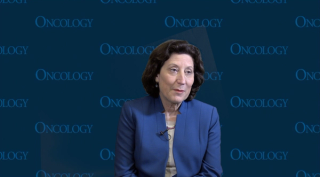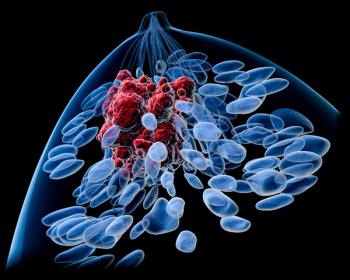
Breast Cancer
Latest News

Latest Videos

CME Content
More News

Andrew Brenner, MD, presents the case of a 62-year-old patient with stage II HER2+ mBC presenting with both pulmonary and brain metastases.

Joyce O’Shaughnessy, MD, starts a conversation on managing the adverse events of tucatinib therapy in patients with HER2+ mBC with brain metastases.

Comprehensive review of novel combination treatment strategies being explored for patients with HER2+ breast cancer and brain metastases.

Panelists reflect on sequencing therapy for HER2+ metastatic breast cancer following disease progression on the tucatinib, trastuzumab and capecitabine regimen.

The presence of several risk factors—such as age, race and mutation status—for contralateral breast cancer must be considered when making treatment decisions, according to an expert from the Mayo Clinic.

Recent study findings related to risk factors for developing contralateral breast cancer may better influence treatment decisions between patients and physicians, according to a Mayo Clinic expert.

An expert from the Mayo Clinic discusses findings from a population-based study concerning germline genetic mutations as risk factors of contralateral breast cancer.

A panel of expert oncologists highlight the use of the tucatinib, trastuzumab and capecitabine regimen that was investigated in the HER2CLIMB trial to manage patients with HER2+ breast cancer and brain metastases.

Expert perspectives on the respective role of radiation therapy to manage brain metastases in the setting of HER2+ breast cancer.

An expert from the Mayo Clinic explains why he and his colleagues are researching risk factors for contralateral breast cancer in carriers of moderate-risk genes such as ATM, CHEK2, and PALB2.

18F-sodium fluoride PET-CT appeared to be a more accurate identifier of bone metastases in patients with breast and prostate cancer than the standard SPECT method.

Judy C. Boughey, MD; Robert Mutter, MD; and Siddhartha Yadav, MD, MBBS, of Mayo Clinic spoke with CancerNetwork® multidisciplinary findings presented at the 2022 San Antonio Breast Cancer Symposium, ranging from surgery to radiotherapy to biomarker research.

Shared consideration on the factors that dictate selection of optimal therapy for patients with HER2+ breast cancer and brain metastases.

Switching to a patient case of brain metastases in HER2+ breast cancer, panelists highlight available therapeutic strategies in this setting.

The panel reviews the treatment approaches for HER2+ mBC with active brain metastases and the factors to consider during treatment decision-making.

Virginia Kaklamani, MD, presents the case of a 60-year-old patient with stage III HER2+ mBC with brain metastases.

A brief review on how best to identify, delay, or avoid brain metastases in patients diagnosed with metastatic HER2+ breast cancer.

Centering discussion on a patient scenario of stage II HR+ breast cancer, expert panelists consider how they would approach workup and selection of therapy.

Having outlined available treatment options for patients with HER2+ metastatic breast cancer, expert panelists share which factors help to select optimal therapy.

During the 2022 San Antonio Breast Cancer Symposium, Neil M. Iyengar, MD, took over the CancerNetwork® Twitter to review key presentation takeaways.

The FDA’s approval of new indications and dosing regimens of capecitabine across several cancer types, including breast cancer and colon cancer, marks the first drug to receive an update under the agency’s Project Renewal program.

Heather McArthur, MD, describes what treatment options she would consider in the third-line setting for HER2+ mBC.

Andrew Brenner, MD, explains when physicians should screen patients with HER2+ breast cancer for brain metastases.

Patients with HER2-positive metastatic breast cancer experienced promising preliminary safety and efficacy with trastuzumab deruxtecan alone and in combination with pertuzumab.

Improvements in survival were observed in patients with pretreated, endocrine-resistant hormone receptor–positive, HER2-negative metastatic breast cancer who were treated with sacituzumab govitecan vs physician’s choice.










































